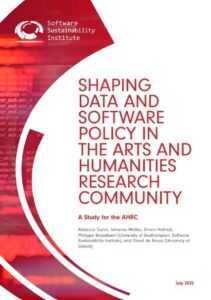When I started working as a Senior Investment Manager in the Arts and Humanities Research Council (AHRC) Skills team in the summer of 2020, one of my first activities was to set up a project investigating digital and data practices and skills needs in our community. This blog post explores some of the key learnings of this project, and how AHRC intends to support digital skills within the arts and humanities research community.
Some level of digital literacy is necessary for navigating everyday life in the 21st century. Equally true is the importance of managing, analysing, visualising and sharing data in arts and humanities research. Yet, not all arts and humanities researchers have access and opportunity to undertake relevant training, develop skills, and make use of data and digital tools in ways that:
- directly enhance their research
- align to best practice
- allow for data sharing and reuse
- prevent data loss
- and make research outputs more accessible to a wide range of audiences
As a major national funder of arts and humanities research, AHRC recognizes that access to training, resources and skills development in this area is neither evenly distributed nor universal. The 2019 AHRC delivery plan included an ambition to:
address the shortage of skills in digital asset management and data manipulation as part of our integrated programme of infrastructure development.
We have reiterated and expanded on this in our 2022 to 2025 strategic delivery plan.
A new study

Cover of the report, Shaping data and software policy in the arts and humanities research community, publication date July 2022. (Credit: Software Sustainability Institute)
It was timely for AHRC to commission a study which:
- explored skills shortages
- examined approaches to use of research data and software
- identified gaps in digital infrastructure and skills provision
The mixed-methods study included 12 exploratory interviews, 30 in-depth interviews and a survey completed by 281 UK researchers in academic, professional, and technical roles – at all career stages – from a broad range of arts and humanities disciplines.
It was delivered by a team consisting of Dr Rebecca Taylor, Dr Johanna Walker, Professor Simon Hettrick (University of Southampton, Software Sustainability Institute) and Professor David de Roure (University of Oxford) and the full report is now available.
Snapshot of findings
Contrary to the misconception of arts and humanities researchers undertaking mostly ‘analogue’ or non-digital research activity, our researcher community uses a wide range of digital assets and software. However, the degree of proficiency, frequency of use and storage practices varies greatly between and within community groups.
According to the study, skills gaps related to digital assets, software and data among arts and humanities researchers have been identified at all career stages. These gaps are not specific to a particular cluster of universities or other research organisations lacking specific infrastructure, or a particular sub-discipline.
Interviews helped to reveal the barriers to skills acquisition. These included:
- lack of dedicated time for undertaking training
- uncertainty around which training opportunities are best
- and lack of incentives and information at research organisation level
Informal peer learning and learning on the job are often the only ways of acquiring digital, data and software skills available to arts and humanities researchers within their paid work time.
Recommendations
Thanks to the insights from the study, AHRC is:
- sharpening the focus of on-going investment such as Infrastructure for digital arts and humanities
- adopting a people-centred approach to address researchers’ needs in the digital and data area through a programme of short, mid- and long-term activities
We’re on the journey to improve the digital and data skills of our community. We will focus on capacity building according to the following broad recommendations from the report:
- Changing culture and promoting best practice (articulating clear support for software, data and digital skills).
- Developing skills and career pathways (training in data, software and digital skills).
- Enhancing infrastructure and providing incentives to use it (research funding, sustainability, support for interoperable systems).
Ongoing activity
Recommendations proposed by the study team are ambitious. AHRC has anticipated some of them and already organised a funding opportunity for pilot training and skills development packages for the use of digital tools and methods in arts and humanities research. Outcomes will be announced in November 2022.
We are also undertaking an engagement exercise about the future of arts and humanities doctoral training, and this report will be an important addition to the evidence base.
Next actions
Our short-term actions will include:
- producing a new policy specifying requirements regarding data and software creation, storage and sharing in arts and humanities
- encouraging our doctoral training award holders to offer individual and cohort training in relevant areas
- updating our research funding guide to make it clearer that we support research teams including data specialists such as research software engineers, through our funding
We will deliver these short-term actions before the end of the current financial year.
Over the next few years, as part of an ongoing, integrated programme of investment in digital research infrastructure and skills, we will establish a network of 3 to 5 national centres to develop and embed the use of digital tools and methods across our community. This will be undertaken in continuous dialogue with our research community to ensure the programme addresses their training needs.
As stated in the 2022 to 2025 strategic delivery plan, we will also:
ensure that arts and humanities research data are accessible, findable, and reusable through specialist data services provided by a new national infrastructure for digital innovation and curation, investing at least £8 million in the next 3 years.
Ensuring that every arts and humanities researcher in the UK has access to and takes advantage of relevant digital and data skills training and facilities to enhance their research is a collective effort. We are committed to the actions outlined here. We would also like to hear from the community via email at researcher.development@ahrc.ukri.org so we can work together in this area.
Top image: Credit: LaylaBird, E+ via Getty Images




